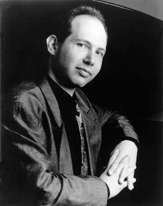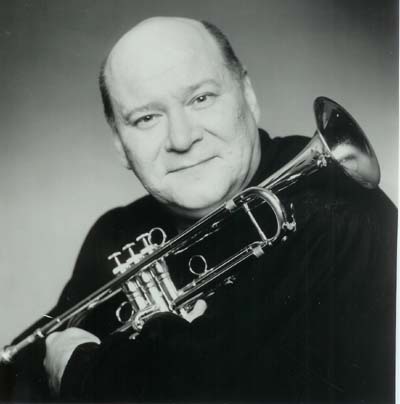 Cornet and piano? That's all? What's
that about? Would that work in jazz? You bet it does, although it
must be admitted that the combination is a bit unusual, and makes enormous
demands on the musicians. As Martha and the Vandellas once put it, there's
"Nowhere to run, nowhere to hide." For these duets to hold up,
the level of invention - of musicianship - must be extraordinary. In fact
there is a rather distinguished history of such duets, going back to 78s
by King Oliver and Jelly Roll Morton (that I've not heard) and Louis Armstrong
and Earl Hines' famous collaboration on "Weatherbird." In the
'50s John Hammond produced a series of sessions in which pianist Ellis Larkins
and cornetist Ruby Braff played standards. These duets caused something
of a stir at the time and were very favorably reviewed. But, for years,
unless you had the original Vanguard 10" records, there was no way
to hear this music. Happily, much of this material is now available on CD,
and it stands up well. But a lot has gone on in half a century (!) and there
is a richer history against which improvisation can be heard today. In the
50's, bop was still relatively new, and the work of great jazz composers
such as Monk and Mingus had not made its way into the jazz "songbook."
There is today more opportunity - and more danger - in this exceptionally
exposed format. But along with the danger, the exposure, there is much to
be gained for both musician and listener. The musicians have a chance to
practice their craft without a net, as it were, and the listener has an
opportunity to see or hear with exceptional clarity just what is going on
as the musicians think the tunes through. But make no mistake, this format
takes an exceptional level of playing skill, and intellectual acuity.
Cornet and piano? That's all? What's
that about? Would that work in jazz? You bet it does, although it
must be admitted that the combination is a bit unusual, and makes enormous
demands on the musicians. As Martha and the Vandellas once put it, there's
"Nowhere to run, nowhere to hide." For these duets to hold up,
the level of invention - of musicianship - must be extraordinary. In fact
there is a rather distinguished history of such duets, going back to 78s
by King Oliver and Jelly Roll Morton (that I've not heard) and Louis Armstrong
and Earl Hines' famous collaboration on "Weatherbird." In the
'50s John Hammond produced a series of sessions in which pianist Ellis Larkins
and cornetist Ruby Braff played standards. These duets caused something
of a stir at the time and were very favorably reviewed. But, for years,
unless you had the original Vanguard 10" records, there was no way
to hear this music. Happily, much of this material is now available on CD,
and it stands up well. But a lot has gone on in half a century (!) and there
is a richer history against which improvisation can be heard today. In the
50's, bop was still relatively new, and the work of great jazz composers
such as Monk and Mingus had not made its way into the jazz "songbook."
There is today more opportunity - and more danger - in this exceptionally
exposed format. But along with the danger, the exposure, there is much to
be gained for both musician and listener. The musicians have a chance to
practice their craft without a net, as it were, and the listener has an
opportunity to see or hear with exceptional clarity just what is going on
as the musicians think the tunes through. But make no mistake, this format
takes an exceptional level of playing skill, and intellectual acuity.
"Rosenthal is a pianist of rarest skill, weaving
rapid single note lines that span out into rich chordal patterns, parallel
octaves and hints of the blues."
Leonard Feather,
The Los Angeles Times |
There is a modern equivalent of the Braff-Larkins duets in which one
of our guests on the 11th, Warren Vaché, plays. It's called 2Gether
(Nagel-Heyer 2011) and features duets by Bill Charlap (Jazz Nights 1 and
4) and Mr. Vaché. The disc is masterly, and shows how in the hands
of exceptional musicians, the 50 years of development since the Larkins-Braff
duets can enrich the music.
Ted Rosenthal and Warren Vaché have not, I think, recorded together
(yet - I certainly hope they will), but they have played together often.
I was lucky enough to catch them at Shanghai last November and immediately
knew they'd be perfect for Jazz Nights. Happily, here they come in about
a month. It was an evening of standards; every tune came from the "Great
American Songbook" (well I guess you have to include Brazil as the
52nd state, for that to be literally true, as there was one Jobim tune),
but Monk was there also in long quotes that essentially took over the whole
song. The interaction between the two musicians was intense, and the music
wonderful.
"The writing and playing exude a confidence
that guarantees he can execute any lick he writes or hears-and it will swing."
Harvey Siders,
Jazz Times,
Feb. 2004 |

"It's no surprise, either, that these two gentlemen are so great,
as they are both most distinguished artists. Mr. Rosenthal won the second
Monk competition in 1988, for example. He now has nine CDs out on his own,
and is a remarkably sensitive and, at the same time vigorous pianist. His
playing, and presumably writing and teaching, is influenced by his love
of classical music, but he swings like mad, and knows the jazz canon very
well. Here are some CDs I recommend. There are several others, but these
catch the spirit of what Jazz Nights 9 is likely to be.
1. One Night in Vermont: Planet Arts, PLONV: Duets with valve trombonist
Bob Brookmeyer.
2. The 3 B's: Playscape PSR#J080199. Solo piano. The three B's are Bud
Powell, Bill Evans and Ludwig van B. I especially like the Bud tunes - Tempus
Fugit, Wail, Parisian Thoroughfare, and I'll Keep Loving You.
3. Live at Maybeck Hall, Vol 38, Concord 4648: Here is Richard Palmer's
take on this one: "One of the best (Maybeck's) I've heard. A pianist
of rare insight and personality. I am particularly taken with his lovingly
historical grasp of jazz piano's panoply. A super CD." -- Richard Palmer,
Jazz Journal
Mr. Vaché can do anything - anything, it seems - on his horn(s).
He reminds me a bit of Rex Stewart, a trumpet player who never played a
bad note in his life, or even of another Ellingtonian, trombonist Tricky
Sam Nanton. Like Tricky Sam, Mr. Vaché loves mutes. He likes to growl
and he gets music from a cornet that may not exactly have been envisioned
by its inventor! He combines the musicianship of Braff with a more modern
outlook on the music. His most recent CD, the excellent "Dream Dancing,"
includes Bird's remake of "Embraceable You," "Quasimodo,"
for example. Here is a sample of Vaché CDs that I like a lot:
"Vaché ...abstracted familiar melodies
with such relaxed invention that his improvisations sounded like great songs
in themselves."
Francis Davis,
The Philadelphia Enquirer |
 1. 2Gether, Nagel-Heyer, 2011. Duets with Bill Charlap. Great CD.
1. 2Gether, Nagel-Heyer, 2011. Duets with Bill Charlap. Great CD.
2. Dream Dancing, Arbors, 19289. his most recent CD with Charlap, Dennis
Irwin (b), Eddie Locke (d), and Harry Allen (tsax).
3. Iridescence, Concord, CJ 4153. It's ancient, but with Hank Jones on
piano, George Duvivier on base and Alan Dawson on drums it is hard to go
wrong.
 Cornet and piano? That's all? What's
that about? Would that work in jazz? You bet it does, although it
must be admitted that the combination is a bit unusual, and makes enormous
demands on the musicians. As Martha and the Vandellas once put it, there's
"Nowhere to run, nowhere to hide." For these duets to hold up,
the level of invention - of musicianship - must be extraordinary. In fact
there is a rather distinguished history of such duets, going back to 78s
by King Oliver and Jelly Roll Morton (that I've not heard) and Louis Armstrong
and Earl Hines' famous collaboration on "Weatherbird." In the
'50s John Hammond produced a series of sessions in which pianist Ellis Larkins
and cornetist Ruby Braff played standards. These duets caused something
of a stir at the time and were very favorably reviewed. But, for years,
unless you had the original Vanguard 10" records, there was no way
to hear this music. Happily, much of this material is now available on CD,
and it stands up well. But a lot has gone on in half a century (!) and there
is a richer history against which improvisation can be heard today. In the
50's, bop was still relatively new, and the work of great jazz composers
such as Monk and Mingus had not made its way into the jazz "songbook."
There is today more opportunity - and more danger - in this exceptionally
exposed format. But along with the danger, the exposure, there is much to
be gained for both musician and listener. The musicians have a chance to
practice their craft without a net, as it were, and the listener has an
opportunity to see or hear with exceptional clarity just what is going on
as the musicians think the tunes through. But make no mistake, this format
takes an exceptional level of playing skill, and intellectual acuity.
Cornet and piano? That's all? What's
that about? Would that work in jazz? You bet it does, although it
must be admitted that the combination is a bit unusual, and makes enormous
demands on the musicians. As Martha and the Vandellas once put it, there's
"Nowhere to run, nowhere to hide." For these duets to hold up,
the level of invention - of musicianship - must be extraordinary. In fact
there is a rather distinguished history of such duets, going back to 78s
by King Oliver and Jelly Roll Morton (that I've not heard) and Louis Armstrong
and Earl Hines' famous collaboration on "Weatherbird." In the
'50s John Hammond produced a series of sessions in which pianist Ellis Larkins
and cornetist Ruby Braff played standards. These duets caused something
of a stir at the time and were very favorably reviewed. But, for years,
unless you had the original Vanguard 10" records, there was no way
to hear this music. Happily, much of this material is now available on CD,
and it stands up well. But a lot has gone on in half a century (!) and there
is a richer history against which improvisation can be heard today. In the
50's, bop was still relatively new, and the work of great jazz composers
such as Monk and Mingus had not made its way into the jazz "songbook."
There is today more opportunity - and more danger - in this exceptionally
exposed format. But along with the danger, the exposure, there is much to
be gained for both musician and listener. The musicians have a chance to
practice their craft without a net, as it were, and the listener has an
opportunity to see or hear with exceptional clarity just what is going on
as the musicians think the tunes through. But make no mistake, this format
takes an exceptional level of playing skill, and intellectual acuity.

 1. 2Gether, Nagel-Heyer, 2011. Duets with Bill Charlap. Great CD.
1. 2Gether, Nagel-Heyer, 2011. Duets with Bill Charlap. Great CD.